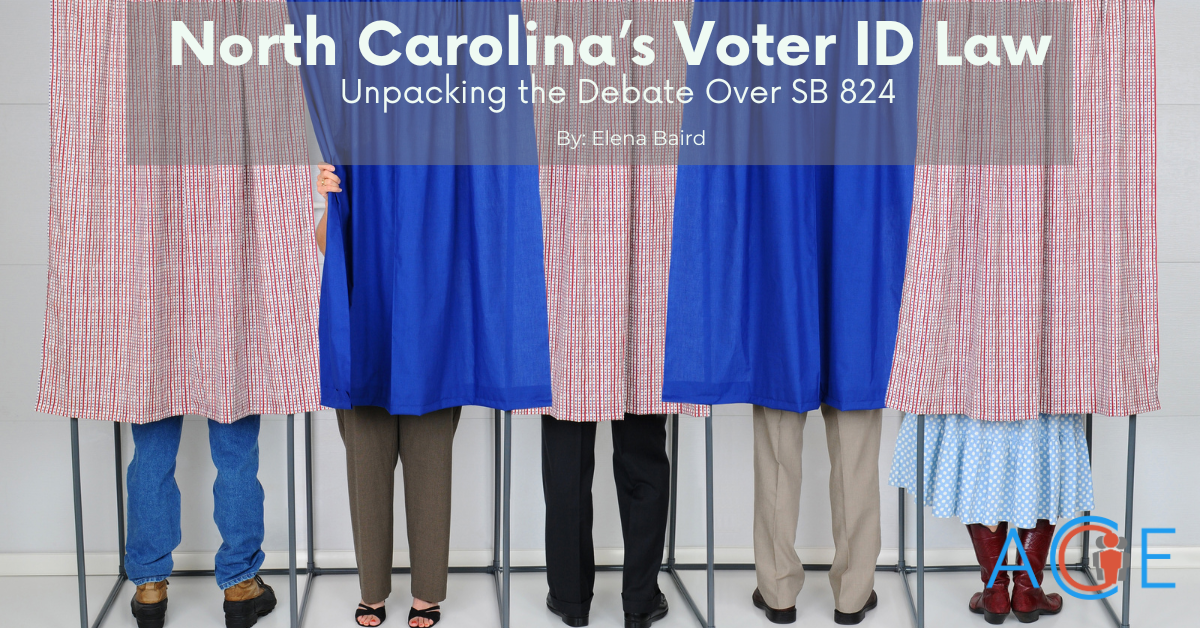Introduction
In the United States, voter ID requirements vary widely by state law. Currently, thirty-eight states strictly require residents to present ID before they can cast a countable ballot. Voter ID laws fall into four types: strict photo, strict non-photo, non-strict photo, and non-strict non-photo. Strict photo ID laws require voters to present photo identification (e.g., state ID or driver’s license) for their ballot to be counted. Strict non-photo ID laws accept non-photo identification like utility bills. Voters without acceptable ID in strict-law states must cast a provisional ballot and take additional steps after election day for their vote to be counted. On the other hand, non-strict non-photo and non-strict photo laws allow voters without preferred identification to cast a regular, countable ballot. Regardless of state laws, first-time voters must always present ID under federal law.
North Carolina’s SB 824
In 2018, North Carolina amended its state constitution to adopt a strict photo ID law in a referendum vote that passed with a 55.49% majority. Around 3.7 million of North Carolina’s 7.1 million registered voters (around 52%) voted on the referendum, which was implemented via North Carolina Senate Bill 824. SB 824 requires all residents to show a form of identification with a photograph in order to cast a countable ballot at a polling place. Those without ID can cast a provisional ballot, which is counted only if they present ID to the county Board of Elections by the end of vote counting. SB 824 also initiated a statewide program to provide free photo ID cards to registered voters at all county Boards of Elections.
Contention and Court Battles
SB 824 has been met with contention at all stages of the legislative process. North Carolina Governor Roy Cooper vetoed SB 824, calling the law “a solution in search of a problem”. However, the North Carolina House of Representatives overrode the veto soon after and enacted the law. In an initial legal challenge through the state court system (Holmes v. Moore), the North Carolina Supreme Court suspended the law after finding it unconstitutional because it was enacted with discriminatory intent. After a shift in the composition of North Carolina’s Supreme Court, the case was re-argued and the decision reversed in 2023. Following this decision, the voter ID law was enacted once again in concordance with the House of Representatives veto override.
Most recently, in May of 2024, a separate court case (NAACP v. Hirsch) has begun trial. This case also challenges North Carolina’s voter ID law–but on a larger scale. While Holmes v. Moore was argued through the state trial courts, NAACP v. Hirsch is being argued through the federal court system, and challenges the constitutionality of SB 824 under the U.S. Constitution rather than the North Carolina State Constitution. This case has not yet been decided.
Arguments Against
Opponents of SB 824 argue that the strict photo-ID law unnecessarily restricts access to voting. In his veto announcement, Governor Cooper claimed that the law “puts up barriers to voting that will trap honest voters in confusion and discourage them with new rules”. Some civil rights organizers agree, arguing that the law effectively imposes a voting fee for voters who lack photo ID through the indirect costs (transportation, time away from work, etc.) associated with obtaining a new ID. They state that the added voting requirements will disproportionately burden Black voters, who are “more likely to be employed in a job that does not allow time off during the normal business hours when government offices that issue IDs are open”. North Carolina State Representative Marcia Morey voiced concerns about the bill impacting other marginalized groups, stating “This amendment could disenfranchise 300,000 voters, including people with disabilities, elderly citizens, college students and those who do not drive”.
Opponents also argue the provisional ballot system disenfranchises voters. In 2022, witnesses testified that some votes went uncounted due to inadequate follow-up with voters who cast provisional ballots. Moreover, opponents highlight the lack of public awareness about the new rules, citing reports that suggest North Carolina residents’ unfamiliarity with the new laws led to valid ballots being incorrectly rejected. Citing low levels of in person voter fraud and North Carolina’s history of enacting voting laws with discriminatory intent, opponents argue that SB 824 is an unnecessary deterrent to political participation.
Arguments in Favor
Those in favor of SB 824 rebuff claims of racial discrimination surrounding the law, stating that there is insufficient evidence proving SB 824 disproportionately burdens voters of color. Proponents call SB 824 “common sense” for election security, and note that voter fraud is likely underreported and could be a bigger problem than what their opponents suggest.
Supporters also hold that SB 824 is the will of the people, given that a majority of voters cast ballots in favor of the amendment in the 2018 referendum. They argue that infringing upon a referendum supported by a democratic majority is an affront to democratic values in their state. Furthermore, since a national poll shows that voter fraud is perceived as a major problem by nearly half of the American public, supporters claim that voter ID laws are necessary because they have the potential to increase the public’s trust in the election process. They hold that by increasing the perceived security of elections, SB 824 will encourage North Carolinians to show up at the polls and make their voices heard.
Conclusion
The debate over North Carolina’s SB 824 reflects the broader national conflict surrounding voter ID laws and their impact on election access and security. Proponents see these laws as essential for maintaining the integrity of elections, while opponents argue they create unnecessary barriers for marginalized communities. As the legal battle over SB 824 moves through federal courts, its outcome could set a significant precedent, shaping future voter ID laws across the country.


